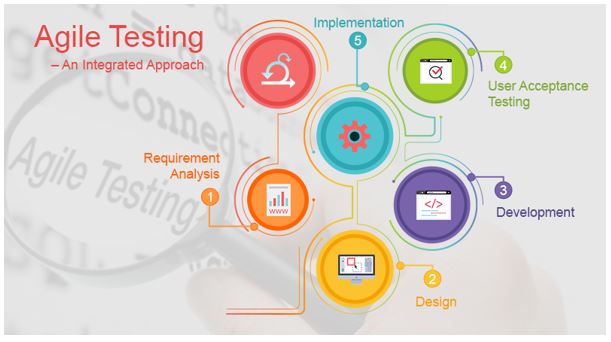“Agility might be said to be about encountering all the problems so early and so often that the effort to fix them is less than the pain of enduring them” – Ron Jeffries.
As always, testing has proven to be the backbone of a quality rich, and stable software application and with time and technology running at a full speed, this arena has witnessed a transition from a traditional Waterfall approach to a state-of-the-art and most practical Agile methodology. Agile Testing is a test-driven approach that abides by the principles of Agile software development. Considered to be an iterative development technique, requirements here evolve through collaboration between the client and self-organizing groups which are then aligned to client needs. When any organization attempts to undergo this transition, there are certain key areas and challenges that are to be encountered and crossed.
The very basic concept of Agile Testing Services lies in its fundamental presence in all the phases of SDLC starting from inception till implementation. Gone are the days when testing used to start off after the development phase was over. This modern-day technology now talks of integrated testing throughout the lifecycle, testing each and every component, through various iterations, all through the phases. Earlier, the traditional approach was a huge one and that too towards the end of the development phase while here, these are small, iterative chunks of testing material that assure you of a well-tested, integrated, team-oriented, and robust deliverable all through the project development.
5 Significant Skills an Agile Testing Team Needs to Possess
- Test Automation & Test Driven Development
Any agile team member needs to be well versed with Test automation and Test Driven Development (TDD) techniques, which play the most vital roles in Software Testing. When we talk about short chunks of testing all throughout, it is very obvious reasoning as to why automation is a must and manual isn’t feasible. Apart from that, TDD acts as a software development method that uses short development cycles, depending upon pre-written test cases, and integrates testing, as well as design processes, which is a must when it comes to Agile. It is considered to be the right step for attaining enhanced quality within restricted time frames. Apart from this, other testing skills such as acceptance TDD, white box testing, black-box testing are also equally important to achieve the best of results.
- Interpersonal Skills
The moment we enforce the testing teams to be involved right from the start, their interaction with other teams, mainly developers and analysts, increases multi-fold, exactly the opposite of what earlier used to be – in the waterfall approach when the entry of testers came in once the developers did their job. So, primarily, the Agile Software Testing Solutions call for teams that are highly qualified in terms of interpersonal skills and are adept at collaboration, communication, and team management. These team members cannot afford to retain their typical ‘tester’ mindset, which used to allow them to have a higher command over the developers when it came to sharing testing results. They need to imbibe tolerance, positivity, and friendliness within the teams.
- Excellent Planning
Since agile testing talks about the involvement of teams right from the start, at each and every phase, there has to be perfect and futuristic planning involved so that at no place, there is a delay in the project owing to mismanagement of schedules and strategies. What is really required is a quick response to situations involving testing facets. Self-planning and organization come on the top of the charts for a successful agile testing strategy.
- Technology Expertise
Since this is sheer teamwork, the agile testers need to have a basic foundational knowledge of whatsoever technology is being used in the project. Come what may, simply having detailed knowhow of the testing tools and methodologies doesn’t suffice in this case, since at each and every point, there has to be integrated interactions with the teams, wherein the basic expertise is required. An agile tester is supposed to be at par with the other teams when it comes to understanding and orientation of the system so that on the whole, all the functionalities are attended to.
- Responsibility of Adding Value
The overall responsibility of an agile tester becomes two ways around. They need to be with the project teams to understand the development and implementation methodology but at the same time, they need to understand and grasp the customer requirements in detail so that they are able to justify if the developed solution is able to match client needs or not. If there is any kind of discrepancy or gap in between, the agile tester is the right person to pick it up and get it rectified then and there. Agile Testing Services act as a bridge between the client (what is to be delivered) and the teams (what is being delivered).
SPEC QA offers independent QA and Testing Services across the complete software release lifecycle. We guarantee a process-driven approach in all our quality assurance practices and software testing services.
Our Software Testing Services make certain an accurate blend of Manual and Automated Testing and provide support through the Testing Life Cycle. As an Agile Software Testing Company in India, we possess skilled resources in Automated Testing tools like Selendroid, Selenium, Appium, Robotium, Quick Time Pro, Load Runner, etc. which help in simulating scenarios and performing continuous routine mundane tests.
With a stringent focus on quality and processes, we have been implementing several testing projects in a multitude of technologies. Request a Free POC to test-drive our services.






